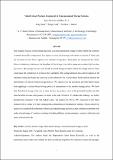Velocity-based Storage Assignment in Semi-automated Storage Systems
Author(s)
Cezik, Tolga; Yuan, Rong; Graves, Stephen C
DownloadMain article to be published (11.62Mb)
OPEN_ACCESS_POLICY
Open Access Policy
Creative Commons Attribution-Noncommercial-Share Alike
Terms of use
Metadata
Show full item recordAbstract
Our research focuses on the storage decision in a semi-automated storage system, where the inventory is stored on mobile storage pods. In a typical system, each storage pod carries a mixture of items, and the inventory of each item is spread over multiple storage pods. These pods are transported by robotic drives to stationary stations on the boundary of the storage zone where associates conduct pick or stow operations. The storage decision is to decide to which storage location within the storage zone to return a pod upon the completion of a pick or stow operation. The storage decision has a direct impact on the total travel time, and hence the workload of the robotic drives. We develop a fluid model to analyze the performance of velocity-based storage policies. We characterize the maximum possible improvement from applying a velocity-based storage policy in comparison to the random storage policy. We show that class-based storage with two or three classes can achieve most of the potential benefits and that these benefits increase with greater variation in the pod velocities. To validate the findings, we build a discrete-time simulator with real industry data. We observe an 8% to 10% reduction in the travel distance with a 2-class or 3-class storage policy, depending on the parameter settings. From a sensitivity analysis we establish the robustness of the class-based storage policies as they continue to perform well under a broad range of warehouse settings including different zoning strategies, resource utilization and space utilization levels.
Date issued
2018-06Department
Massachusetts Institute of Technology. Department of Mechanical Engineering; Massachusetts Institute of Technology. Institute for Data, Systems, and Society; Massachusetts Institute of Technology. Computation for Design and Optimization Program; Sloan School of ManagementJournal
Production and Operations Management
Citation
Yuan, Rong, Tolga Cezik, and Stephen C. Graves. “Velocity-Based Storage Assignment in Semi-Automated Storage Systems.” Production and Operations Management (June 20, 2018).
Version: Author's final manuscript
ISSN
10591478